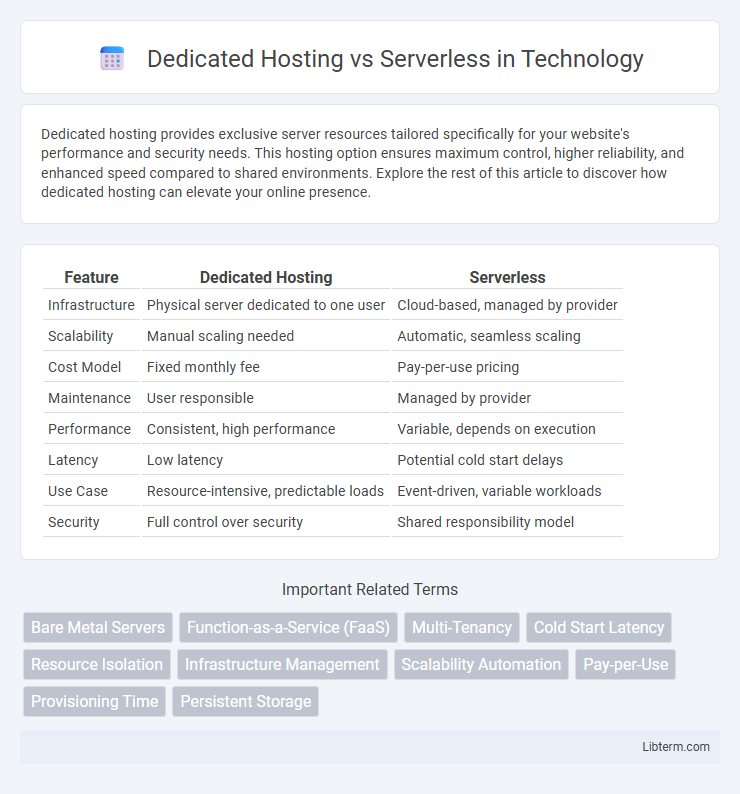Dedicated hosting provides exclusive server resources tailored specifically for your website's performance and security needs. This hosting option ensures maximum control, higher reliability, and enhanced speed compared to shared environments. Explore the rest of this article to discover how dedicated hosting can elevate your online presence.
Table of Comparison
| Feature | Dedicated Hosting | Serverless |
|---|---|---|
| Infrastructure | Physical server dedicated to one user | Cloud-based, managed by provider |
| Scalability | Manual scaling needed | Automatic, seamless scaling |
| Cost Model | Fixed monthly fee | Pay-per-use pricing |
| Maintenance | User responsible | Managed by provider |
| Performance | Consistent, high performance | Variable, depends on execution |
| Latency | Low latency | Potential cold start delays |
| Use Case | Resource-intensive, predictable loads | Event-driven, variable workloads |
| Security | Full control over security | Shared responsibility model |
Introduction to Dedicated Hosting vs Serverless
Dedicated hosting provides exclusive access to a physical server, ensuring high performance, security, and customization for demanding applications. Serverless computing eliminates server management by automatically scaling resources and charging based on actual usage, ideal for flexible and event-driven workloads. Understanding the trade-offs between dedicated hosting's control and serverless's scalability is crucial for optimizing infrastructure costs and operational efficiency.
What is Dedicated Hosting?
Dedicated hosting involves renting an entire physical server exclusively for a single organization, providing full control over server resources, security, and configurations. This hosting option ensures predictable performance with consistent CPU, RAM, and storage dedicated solely to the user's applications and websites. Businesses requiring high levels of customization, data privacy, and resource-intensive workloads often prefer dedicated hosting over shared or serverless environments.
What is Serverless Computing?
Serverless computing allows developers to run applications without managing underlying servers, automatically scaling resources based on demand while charging only for actual usage. Unlike dedicated hosting, which requires fixed physical or virtual servers with pre-allocated capacity, serverless abstracts infrastructure management and offers a pay-per-execution pricing model. Key providers like AWS Lambda, Azure Functions, and Google Cloud Functions enable rapid deployment of event-driven applications with high scalability and reduced operational overhead.
Core Differences Between Dedicated Hosting and Serverless
Dedicated hosting provides a physical server exclusively allocated to a single user, ensuring consistent performance, high security, and complete control over hardware and software configurations. Serverless computing abstracts server management by automatically scaling resources based on demand, allowing developers to focus solely on code execution without infrastructure maintenance. The core differences lie in resource ownership, scalability models, and operational responsibility, with dedicated hosting requiring manual management and predictable resource allocation, while serverless offers event-driven scaling and pay-as-you-go billing.
Performance Comparison: Dedicated Hosting vs Serverless
Dedicated hosting offers consistent high performance with guaranteed resource availability, making it ideal for applications requiring predictable workloads and low latency. Serverless computing scales automatically based on demand but may introduce latency due to cold starts and resource sharing, impacting time-sensitive tasks. For sustained, resource-intensive applications, dedicated hosting outperforms serverless in reliability and speed, while serverless excels in handling variable workloads with cost efficiency.
Scalability and Flexibility Considerations
Dedicated hosting offers robust scalability by providing fixed resources that can be manually upgraded to accommodate increasing workloads, ensuring consistent performance for resource-intensive applications. Serverless architecture delivers unparalleled flexibility and automatic scaling by dynamically allocating compute power based on real-time demand, eliminating the need for capacity planning. Choosing between dedicated hosting and serverless depends on specific workload patterns, with dedicated hosting suited for predictable, high-demand scenarios and serverless ideal for variable or unpredictable traffic requiring rapid scaling.
Cost Analysis: Upfront and Ongoing Expenses
Dedicated hosting requires significant upfront investments in hardware acquisition, setup, and maintenance, leading to higher initial costs compared to serverless architectures. Ongoing expenses for dedicated servers include electricity, cooling, hardware maintenance, and IT staff salaries, which remain relatively fixed regardless of usage. Serverless computing offers a pay-as-you-go pricing model, minimizing upfront costs and aligning ongoing expenses directly with actual resource consumption, providing cost efficiency for variable workloads.
Security and Compliance Aspects
Dedicated hosting provides enhanced security through physical isolation, customizable firewalls, and controlled access, making it ideal for organizations with strict regulatory compliance requirements like HIPAA, PCI DSS, or GDPR. Serverless architectures offer built-in security features managed by cloud providers, including automatic patching and isolation at the function level, but may introduce challenges in maintaining compliance due to multi-tenancy and less control over the underlying infrastructure. Choosing dedicated hosting ensures greater visibility and auditability, while serverless demands rigorous monitoring and adherence to cloud provider certifications to meet security standards.
Use Cases: When to Choose Each Solution
Dedicated hosting is ideal for businesses requiring full control over hardware resources, high-performance computing, consistent workloads, and stringent security compliance, such as e-commerce platforms, large enterprise applications, and databases. Serverless computing excels in event-driven architectures, microservices, and applications with unpredictable or variable traffic, enabling automatic scaling and cost efficiency for startups, mobile backends, and IoT applications. Choosing between dedicated hosting and serverless depends on workload consistency, security requirements, and scalability needs, with dedicated hosting favoring predictable, resource-intensive tasks and serverless supporting dynamic, ephemeral processes.
Conclusion: Choosing the Right Hosting Approach
Dedicated hosting provides robust performance with full server control, ideal for resource-intensive applications and businesses requiring high security and customization. Serverless hosting offers scalability and cost-efficiency by managing infrastructure automatically, best suited for event-driven workloads with variable traffic. Selecting the right hosting approach depends on your specific needs for control, scalability, budget, and application architecture.
Dedicated Hosting Infographic

 libterm.com
libterm.com